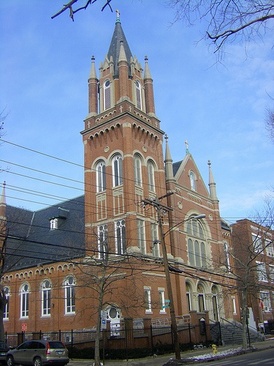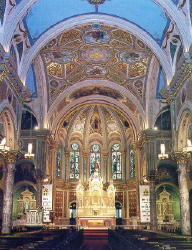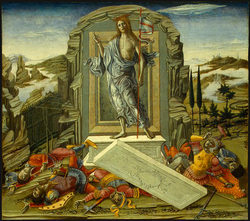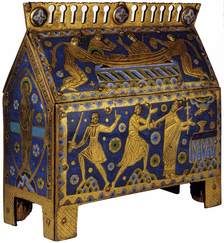
Archbishop Henry J. Mansell, Archbishop of Hartford, in a letter to the Saint Gregory Society of New Haven, Connecticut, gave his permission for the Traditional Latin Mass community to relocate from Sacred Heart Church in New Haven to Saint Stanislaus Church at 9 Eld Street in New Haven.
"He wants to be certain the church is appropriate for your needs," wrote the archbishop.
He gave permission for the first Traditional Latin Mass at Saint Stanislaus in New Haven to be on The Feast of the Holy Cross, September 13, 2009. The Mass according to the 1962 Roman Missal will be celebrated at 2 pm at Saint Stanislaus just as it had been celebrated at 2 PM at Sacred Heart.
In his cordial letter of introduction, Archbishop Mansell encouraged cordial relations with the pastor, Father Roman Kmiec, C.M., pastor of Saint Stanislaus. Father Kmiec has indeed warmly welcomed the Saint Gregory Society.
Archbishop Mansell said he was "glad to help" the Saint Gregory Society in finding a new home for the Community.

Saint Stanislaus Church is staffed by the Congregation of the Mission (the Vincentians) of the New England Province. The Vincentians, an congregation of priests and brothers founded by Saint Vincent de Paul in the 1600s, spread the gospel message of Jesus in championing the needs of the poor.
The De Paul Provincial House is located at 234 Keeney Street in Manchester, CT.
I am happy to receive this news. I spent nine years of my formative years at Saint Stan's with the Vincentians and the Congregation of the Holy Family of Nazareth. Saint Stan's is New Haven's best looking church maintaining the original artwork and liturgical furnishings.
The Saint Gregory Society of New Haven is a non-profit lay association founded in 1985 to promote the local celebration of the Traditional Latin Liturgy according to the Tridentine Missal in response to the Papal indult of October 3, 1984, Quattuor abhinc annos, which granted the use of the liturgical books in force in 1962.
Since January 1986, the Traditional Latin Mass regularly has been celebrated at the Sacred Heart Church in downtown New Haven. The Saint Gregory Society exists primarily to advocate the preservation of the immemorial rite of the Mass, to work for its celebration on a regular and unrestricted basis, and to disseminate information about and cultivate interest in the classical Roman liturgy and its central importance for Catholic faith and culture.
The Society supports a professional Schola Cantorum that provides the proper Gregorian chant and sacred polyphony for all sung liturgical functions.
For further information: contact@saint-gregory.org.
(this article is edited & adapted)




